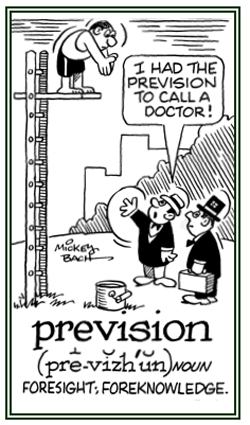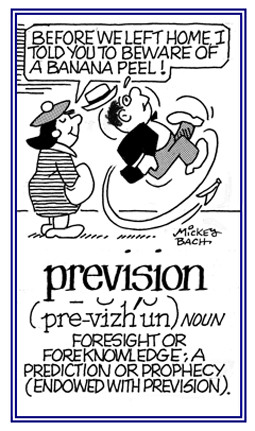vid-, video-, vis-, -vision, -visional, -visionally, visuo-, vu-
(Latin: videre, "to see"; plus words with other related meanings: to notice, noticing, noticed; observe, observing, observed; look, looking, looked; perceive, perceiving, perceived, perception; see, seeing, saw, seen, sight; view, viewing, viewed; manifest, manifesting, manifested; reveal, revealing, revealed, revelelation)
Although many of the words in this unit seem to be from other Latin origins, all of them are etymologically derived from the main Latin videre, "to see" element.
omnividence
Being able to see everything or perceiving all things.
omnivision
1. Seeing everything or perceiving all things.
2. The name of a company, OmniVision Technologies, Inc.; which is a corporation that designs and develops digital imaging solutions, including providing Apple Inc. with a back-illuminated CMOS sensor (complementary metal-oxide-semiconductor) which is located in the backside of the iPhone 4's camera.
2. The name of a company, OmniVision Technologies, Inc.; which is a corporation that designs and develops digital imaging solutions, including providing Apple Inc. with a back-illuminated CMOS sensor (complementary metal-oxide-semiconductor) which is located in the backside of the iPhone 4's camera.
oscillating vision
A dancing movement of objects caused by spontaneous eye movements.
peripheral vision
The area of the visual field seen by the extramacular portions of the retina.
Extramacular refers to the outside part of the macula of the eye which is the small spot that is different from the surrounding tissue.
persistence vision
A visual impression that outlasts the duration of the physical stimulus giving rise to it.
This occurs as a result of a sensory lag.
photerythrous vision
A red discoloration of the vision during an adaptation to light.
1. A screening of a film for an advance showing to a selected audience: Before the release of the presentation of the movie for everybody, a preview was shown in the town theater.
2. An advertisement consisting of short scenes from a motion picture before it appears in the near future, or to see parts of a play or exhibit before it is available to the general public: Mrs. Smart wanted to see the preview of the movie first before deciding if she really wanted to go.
3. An introductory or preliminary message, sample, or overview; a foretaste: In the newspaper there was a preview of the upcoming event of the famous author appearing at the local bookstore to present and sign his newest novel.
4. A piece printed in a paper or magazine or broadcast on radio or TV describing and commenting on something that is soon to be broadcast or presented to the public: The preview of the upcoming talk show to take place the next day was shown between the other commercials on Jane's television.
5. A sample or foretaste of something likely to occur in the future: The political polls could provide a preview of the actual election results.
2. An advertisement consisting of short scenes from a motion picture before it appears in the near future, or to see parts of a play or exhibit before it is available to the general public: Mrs. Smart wanted to see the preview of the movie first before deciding if she really wanted to go.
3. An introductory or preliminary message, sample, or overview; a foretaste: In the newspaper there was a preview of the upcoming event of the famous author appearing at the local bookstore to present and sign his newest novel.
4. A piece printed in a paper or magazine or broadcast on radio or TV describing and commenting on something that is soon to be broadcast or presented to the public: The preview of the upcoming talk show to take place the next day was shown between the other commercials on Jane's television.
5. A sample or foretaste of something likely to occur in the future: The political polls could provide a preview of the actual election results.
previse (verb), previses; prevised; prevising
1. To foresee or to forecast; predict: Jim's professor at college was very intelligent and could previse a probable future.
2. To warn; to inform ahead of time: Dr. Smith prevised Jim of the dangers of drinking alcoholic beverages and smoking.
3. Etymology: from Latin praevisus, past participle of praevidere, "to foresee"; from pre-, "before" + videre, "to see".
2. To warn; to inform ahead of time: Dr. Smith prevised Jim of the dangers of drinking alcoholic beverages and smoking.
3. Etymology: from Latin praevisus, past participle of praevidere, "to foresee"; from pre-, "before" + videre, "to see".
1. A prophetic revelation, as in a dream: Kate's prevision about a hurricane coming to her area prompted her to equip the storm cellar with food and water.
2. The process of predicting or forecasting; such as, by reasoning or a premonition about the future based on facts, figures, etc.: Reginald's prevision that economical conditions could cause a bad financial situation for his family resulted in his saving enough money to provide for their well-being for years to come.

© ALL rights are reserved.

© ALL rights are reserved.
Go to this Word A Day Revisited Index
2. The process of predicting or forecasting; such as, by reasoning or a premonition about the future based on facts, figures, etc.: Reginald's prevision that economical conditions could cause a bad financial situation for his family resulted in his saving enough money to provide for their well-being for years to come.


Go to this Word A Day Revisited Index
so you can see more of Mickey Bach's cartoons.
previsional (adjective), more previsional, most previsional
previsionally (adverb), more previsionally, most previsionally
Someone who has the powers to foresee what will happen in the future.
providable (adjective) (not comparable)
Capable of being made available or extended as support: Supplementary teaching aids are providable to the members of the staff when ordered in time.
provide
1. To supply someone with something, or be a source of things that are needed or wanted by someone.
2. To require something in advance as a condition or as part of a contract.
3. To take precautions to prevent harm or to bring about good; such as, to provide against a potential disaster.
4. To supply the material means of support for someone: "She provides for her children by working at two jobs."
5. Etymology: from Latin providere, "to look ahead, to see ahead, to prepare in advance, to supply"; literally, "to see ahead"; from pro-, "ahead" + videre, "to see".
2. To require something in advance as a condition or as part of a contract.
3. To take precautions to prevent harm or to bring about good; such as, to provide against a potential disaster.
4. To supply the material means of support for someone: "She provides for her children by working at two jobs."
5. Etymology: from Latin providere, "to look ahead, to see ahead, to prepare in advance, to supply"; literally, "to see ahead"; from pro-, "ahead" + videre, "to see".
provided, providing
1. On condition that or with the understanding that another thing will also occur or be done.
2. With the understanding that as long as certain conditions exist before something will be done, then certain actions will take place: "We are willing to help, provided that she has a specific plan for accomplishing the project."
2. With the understanding that as long as certain conditions exist before something will be done, then certain actions will take place: "We are willing to help, provided that she has a specific plan for accomplishing the project."


